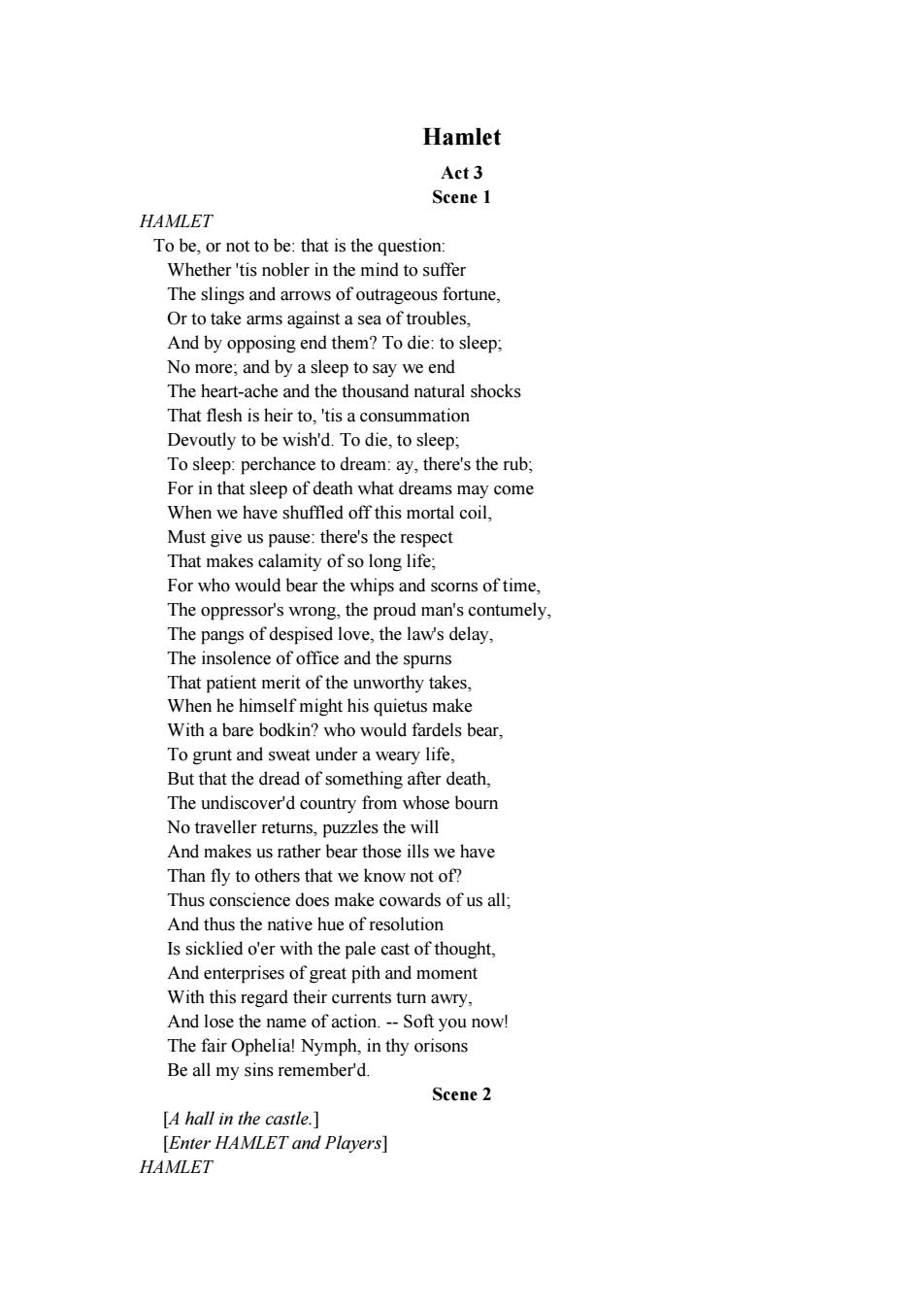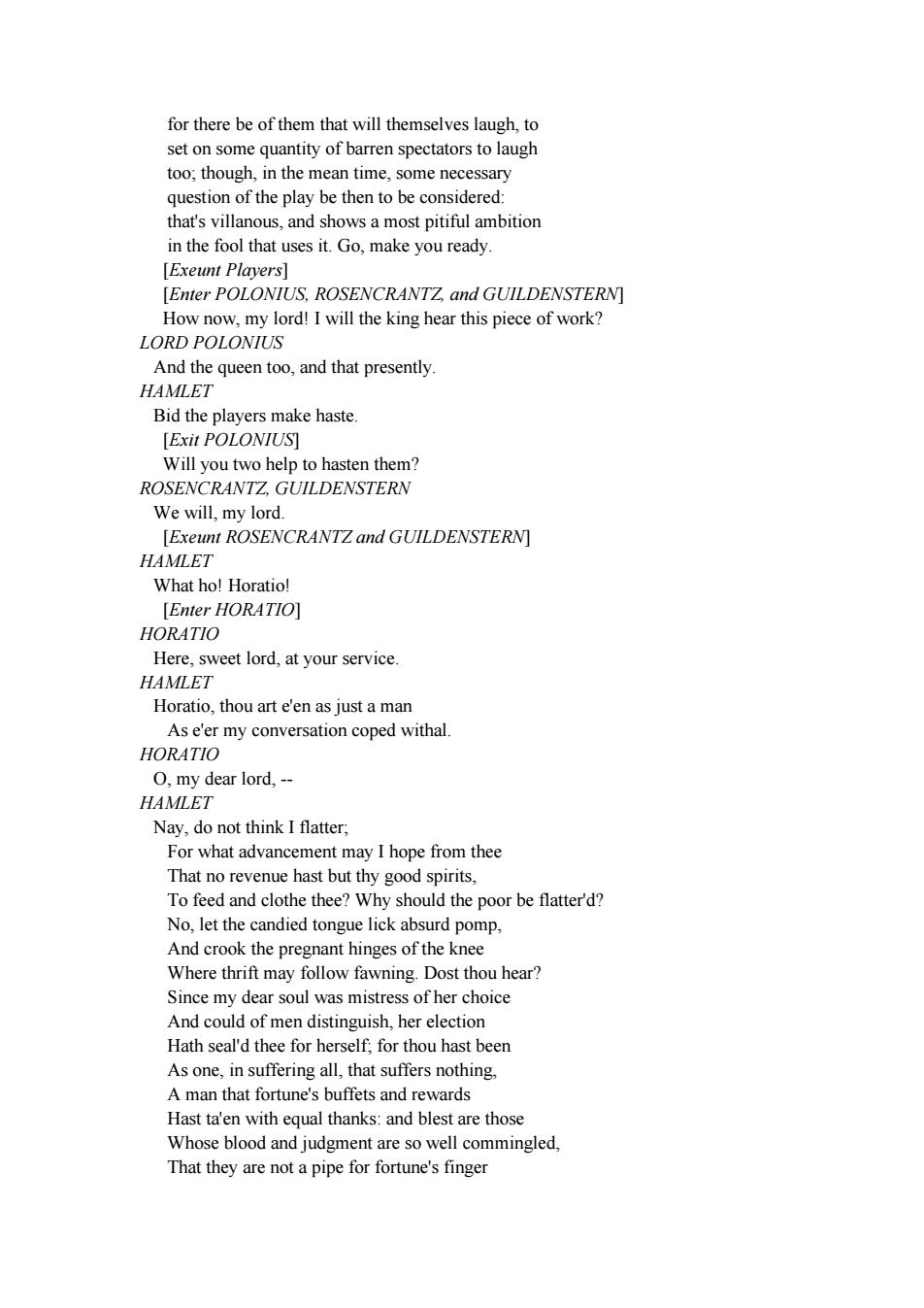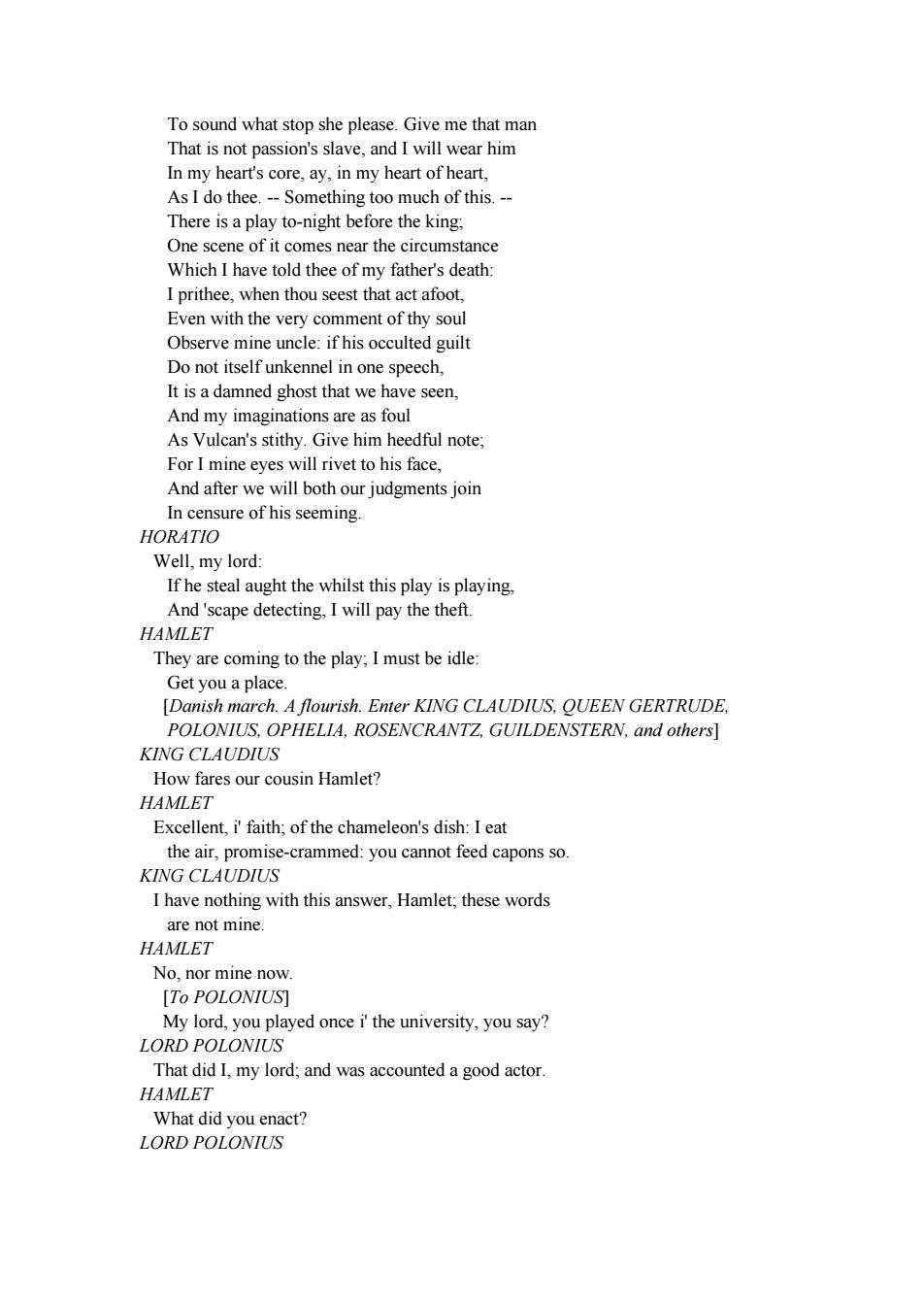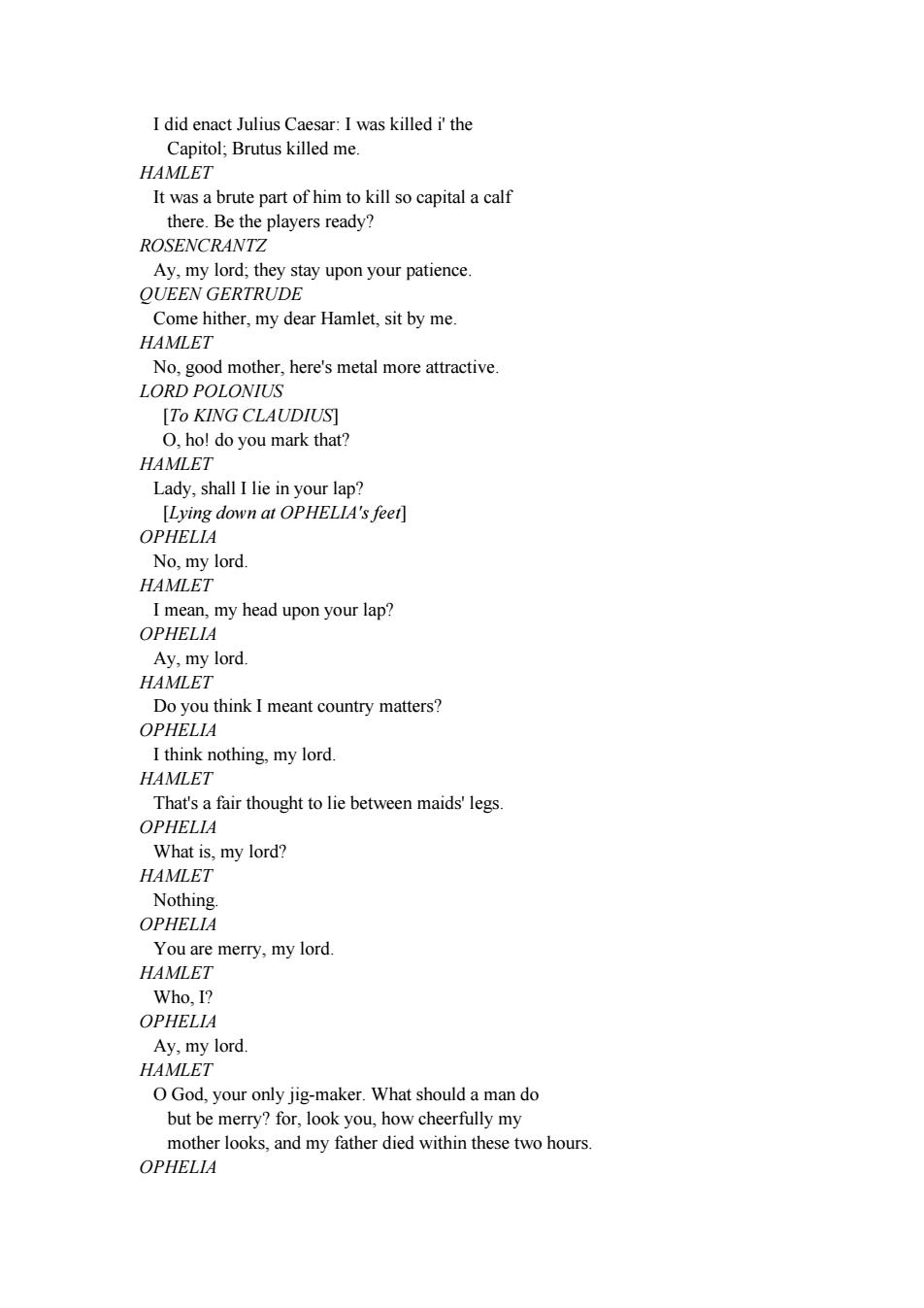
Hamlet Act3 Scene 1 HAMLET To be,or not to be:that is the question: Whether'tis nobler in the mind to suffer The slings and arrows of outrageous fortune, Or to take arms against a sea of troubles, And by opposing end them?To die:to sleep; No more;and by a sleep to say we end The heart-ache and the thousand natural shocks That flesh is heir to,'tis a consummation Devoutly to be wish'd.To die,to sleep; To sleep:perchance to dream:ay,there's the rub; For in that sleep of death what dreams may come When we have shuffled off this mortal coil. Must give us pause:there's the respect That makes calamity of so long life; For who would bear the whips and scorns of time, The oppressor's wrong,the proud man's contumely, The pangs of despised love,the law's delay, The insolence of office and the spurns That patient merit of the unworthy takes, When he himself might his quietus make With a bare bodkin?who would fardels bear, To grunt and sweat under a weary life, But that the dread of something after death, The undiscover'd country from whose bourn No traveller returns,puzzles the will And makes us rather bear those ills we have Than fly to others that we know not of? Thus conscience does make cowards of us all; And thus the native hue of resolution Is sicklied o'er with the pale cast of thought, And enterprises of great pith and moment With this regard their currents turn awry, And lose the name of action.--Soft you now! The fair Ophelia!Nymph,in thy orisons Be all my sins remember'd. Scene 2 [A hall in the castle.] [Enter HAMLET and Players] HAMLET
Hamlet Act 3 Scene 1 HAMLET To be, or not to be: that is the question: Whether 'tis nobler in the mind to suffer The slings and arrows of outrageous fortune, Or to take arms against a sea of troubles, And by opposing end them? To die: to sleep; No more; and by a sleep to say we end The heart-ache and the thousand natural shocks That flesh is heir to, 'tis a consummation Devoutly to be wish'd. To die, to sleep; To sleep: perchance to dream: ay, there's the rub; For in that sleep of death what dreams may come When we have shuffled off this mortal coil, Must give us pause: there's the respect That makes calamity of so long life; For who would bear the whips and scorns of time, The oppressor's wrong, the proud man's contumely, The pangs of despised love, the law's delay, The insolence of office and the spurns That patient merit of the unworthy takes, When he himself might his quietus make With a bare bodkin? who would fardels bear, To grunt and sweat under a weary life, But that the dread of something after death, The undiscover'd country from whose bourn No traveller returns, puzzles the will And makes us rather bear those ills we have Than fly to others that we know not of? Thus conscience does make cowards of us all; And thus the native hue of resolution Is sicklied o'er with the pale cast of thought, And enterprises of great pith and moment With this regard their currents turn awry, And lose the name of action. -- Soft you now! The fair Ophelia! Nymph, in thy orisons Be all my sins remember'd. Scene 2 [A hall in the castle.] [Enter HAMLET and Players] HAMLET

Speak the speech,I pray you,as I pronounced it to you,trippingly on the tongue:but if you mouth it. as many of your players do,I had as lief the town-crier spoke my lines.Nor do not saw the air too much with your hand,thus,but use all gently; for in the very torrent,tempest,and,as I may say, the whirlwind of passion,you must acquire and beget a temperance that may give it smoothness.O,it offends me to the soul to hear a robustious periwig-pated fellow tear a passion to tatters,to very rags,to split the ears of the groundlings,who for the most part are capable of nothing but inexplicable dumbshows and noise:I would have such a fellow whipped for o'erdoing Termagant;it out-herods Herod:pray you,avoid it. First Player I warrant your honour. HAMLET Be not too tame neither,but let your own discretion be your tutor:suit the action to the word,the word to the action;with this special o'erstep not the modesty of nature:for any thing so overdone is from the purpose of playing,whose end,both at the first and now,was and is,to hold,as'twere,the mirror up to nature;to show virtue her own feature, scorn her own image,and the very age and body of the time his form and pressure.Now this overdone, or come tardy off,though it make the unskilful laugh,cannot but make the judicious grieve;the censure of the which one must in your allowance o'erweigh a whole theatre of others.O,there be players that I have seen play,and heard others praise,and that highly,not to speak it profanely, that,neither having the accent of Christians nor the gait of Christian,pagan,nor man,have so strutted and bellowed that I have thought some of nature's journeymen had made men and not made them well,they imitated humanity so abominably. First Player I hope we have reformed that indifferently with us, sir. HAMLET O,reform it altogether.And let those that play your clowns speak no more than is set down for them;
Speak the speech, I pray you, as I pronounced it to you, trippingly on the tongue: but if you mouth it, as many of your players do, I had as lief the town-crier spoke my lines. Nor do not saw the air too much with your hand, thus, but use all gently; for in the very torrent, tempest, and, as I may say, the whirlwind of passion, you must acquire and beget a temperance that may give it smoothness. O, it offends me to the soul to hear a robustious periwig-pated fellow tear a passion to tatters, to very rags, to split the ears of the groundlings, who for the most part are capable of nothing but inexplicable dumbshows and noise: I would have such a fellow whipped for o'erdoing Termagant; it out-herods Herod: pray you, avoid it. First Player I warrant your honour. HAMLET Be not too tame neither, but let your own discretion be your tutor: suit the action to the word, the word to the action; with this special o'erstep not the modesty of nature: for any thing so overdone is from the purpose of playing, whose end, both at the first and now, was and is, to hold, as 'twere, the mirror up to nature; to show virtue her own feature, scorn her own image, and the very age and body of the time his form and pressure. Now this overdone, or come tardy off, though it make the unskilful laugh, cannot but make the judicious grieve; the censure of the which one must in your allowance o'erweigh a whole theatre of others. O, there be players that I have seen play, and heard others praise, and that highly, not to speak it profanely, that, neither having the accent of Christians nor the gait of Christian, pagan, nor man, have so strutted and bellowed that I have thought some of nature's journeymen had made men and not made them well, they imitated humanity so abominably. First Player I hope we have reformed that indifferently with us, sir. HAMLET O, reform it altogether. And let those that play your clowns speak no more than is set down for them;

for there be of them that will themselves laugh,to set on some quantity of barren spectators to laugh too;though,in the mean time,some necessary question of the play be then to be considered: that's villanous,and shows a most pitiful ambition in the fool that uses it.Go,make you ready. [Exeunt Players] [Enter POLONIUS,ROSENCRANTZ,and GUILDENSTERN How now,my lord!I will the king hear this piece of work? LORD POLONIUS And the queen too,and that presently HAMLET Bid the players make haste [Exit POLONIUS] Will you two help to hasten them? ROSENCRANTZ,GUILDENSTERN We will,my lord. [Exeunt ROSENCRANTZ and GUILDENSTERN HAMLET What ho!Horatio! [Enter HORATIO] HORATIO Here,sweet lord,at your service. HAMLET Horatio,thou art e'en as just a man As e'er my conversation coped withal. HORATIO O,my dear lord,-- HAMLET Nay,do not think I flatter; For what advancement may I hope from thee That no revenue hast but thy good spirits, To feed and clothe thee?Why should the poor be flatter'd? No,let the candied tongue lick absurd pomp, And crook the pregnant hinges of the knee Where thrift may follow fawning.Dost thou hear? Since my dear soul was mistress of her choice And could of men distinguish,her election Hath seal'd thee for herself;for thou hast been As one,in suffering all,that suffers nothing, A man that fortune's buffets and rewards Hast ta'en with equal thanks:and blest are those Whose blood and judgment are so well commingled, That they are not a pipe for fortune's finger
for there be of them that will themselves laugh, to set on some quantity of barren spectators to laugh too; though, in the mean time, some necessary question of the play be then to be considered: that's villanous, and shows a most pitiful ambition in the fool that uses it. Go, make you ready. [Exeunt Players] [Enter POLONIUS, ROSENCRANTZ, and GUILDENSTERN] How now, my lord! I will the king hear this piece of work? LORD POLONIUS And the queen too, and that presently. HAMLET Bid the players make haste. [Exit POLONIUS] Will you two help to hasten them? ROSENCRANTZ, GUILDENSTERN We will, my lord. [Exeunt ROSENCRANTZ and GUILDENSTERN] HAMLET What ho! Horatio! [Enter HORATIO] HORATIO Here, sweet lord, at your service. HAMLET Horatio, thou art e'en as just a man As e'er my conversation coped withal. HORATIO O, my dear lord, -- HAMLET Nay, do not think I flatter; For what advancement may I hope from thee That no revenue hast but thy good spirits, To feed and clothe thee? Why should the poor be flatter'd? No, let the candied tongue lick absurd pomp, And crook the pregnant hinges of the knee Where thrift may follow fawning. Dost thou hear? Since my dear soul was mistress of her choice And could of men distinguish, her election Hath seal'd thee for herself; for thou hast been As one, in suffering all, that suffers nothing, A man that fortune's buffets and rewards Hast ta'en with equal thanks: and blest are those Whose blood and judgment are so well commingled, That they are not a pipe for fortune's finger

To sound what stop she please.Give me that man That is not passion's slave,and I will wear him In my heart's core,ay,in my heart of heart, As I do thee.--Something too much of this.- There is a play to-night before the king; One scene of it comes near the circumstance Which I have told thee of my father's death: I prithee.when thou seest that act afoot. Even with the very comment of thy soul Observe mine uncle:if his occulted guilt Do not itself unkennel in one speech, It is a damned ghost that we have seen, And my imaginations are as foul As Vulcan's stithy.Give him heedful note; For I mine eyes will rivet to his face, And after we will both our judgments join In censure of his seeming. HORATIO Well,my lord: If he steal aught the whilst this play is playing, And 'scape detecting,I will pay the theft. HAMLET They are coming to the play;I must be idle: Get you a place. [Danish march.A flourish.Enter KING CLAUDIUS,QUEEN GERTRUDE, POLONIUS,OPHELIA,ROSENCRANTZ,GUILDENSTERN,and others] KING CLAUDIUS How fares our cousin Hamlet? HAMLET Excellent,i'faith;of the chameleon's dish:I eat the air,promise-crammed:you cannot feed capons so. KING CLAUDIUS I have nothing with this answer,Hamlet;these words are not mine HAMLET No,nor mine now. [To POLONIUS] My lord,you played once i'the university,you say? LORD POLONIUS That did I,my lord;and was accounted a good actor. HAMLET What did you enact? LORD POLONIUS
To sound what stop she please. Give me that man That is not passion's slave, and I will wear him In my heart's core, ay, in my heart of heart, As I do thee. -- Something too much of this. -- There is a play to-night before the king; One scene of it comes near the circumstance Which I have told thee of my father's death: I prithee, when thou seest that act afoot, Even with the very comment of thy soul Observe mine uncle: if his occulted guilt Do not itself unkennel in one speech, It is a damned ghost that we have seen, And my imaginations are as foul As Vulcan's stithy. Give him heedful note; For I mine eyes will rivet to his face, And after we will both our judgments join In censure of his seeming. HORATIO Well, my lord: If he steal aught the whilst this play is playing, And 'scape detecting, I will pay the theft. HAMLET They are coming to the play; I must be idle: Get you a place. [Danish march. A flourish. Enter KING CLAUDIUS, QUEEN GERTRUDE, POLONIUS, OPHELIA, ROSENCRANTZ, GUILDENSTERN, and others] KING CLAUDIUS How fares our cousin Hamlet? HAMLET Excellent, i' faith; of the chameleon's dish: I eat the air, promise-crammed: you cannot feed capons so. KING CLAUDIUS I have nothing with this answer, Hamlet; these words are not mine. HAMLET No, nor mine now. [To POLONIUS] My lord, you played once i' the university, you say? LORD POLONIUS That did I, my lord; and was accounted a good actor. HAMLET What did you enact? LORD POLONIUS

I did enact Julius Caesar:I was killed i'the Capitol;Brutus killed me. HAMLET It was a brute part of him to kill so capital a calf there.Be the players ready? ROSENCRANTZ Ay,my lord;they stay upon your patience QUEEN GERTRUDE Come hither,my dear Hamlet,sit by me. HAMLET No,good mother,here's metal more attractive. LORD POLONIUS [To KING CLAUDIUS] O,ho!do you mark that? HAMLET Lady,shall I lie in your lap? [Lying down at OPHELIA's feet] OPHELIA No,my lord. HAMLET I mean,my head upon your lap? OPHELIA Ay,my lord HAMLET Do you think I meant country matters? OPHELIA I think nothing,my lord. HAMLET That's a fair thought to lie between maids'legs OPHELIA What is,my lord? HAMLET Nothing OPHELIA You are merry,my lord. HAMLET Who,I? OPHELIA Ay,my lord. HAMLET O God,your only jig-maker.What should a man do but be merry?for,look you,how cheerfully my mother looks,and my father died within these two hours. OPHELIA
I did enact Julius Caesar: I was killed i' the Capitol; Brutus killed me. HAMLET It was a brute part of him to kill so capital a calf there. Be the players ready? ROSENCRANTZ Ay, my lord; they stay upon your patience. QUEEN GERTRUDE Come hither, my dear Hamlet, sit by me. HAMLET No, good mother, here's metal more attractive. LORD POLONIUS [To KING CLAUDIUS] O, ho! do you mark that? HAMLET Lady, shall I lie in your lap? [Lying down at OPHELIA's feet] OPHELIA No, my lord. HAMLET I mean, my head upon your lap? OPHELIA Ay, my lord. HAMLET Do you think I meant country matters? OPHELIA I think nothing, my lord. HAMLET That's a fair thought to lie between maids' legs. OPHELIA What is, my lord? HAMLET Nothing. OPHELIA You are merry, my lord. HAMLET Who, I? OPHELIA Ay, my lord. HAMLET O God, your only jig-maker. What should a man do but be merry? for, look you, how cheerfully my mother looks, and my father died within these two hours. OPHELIA